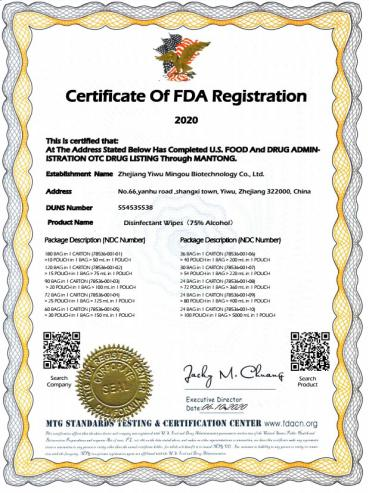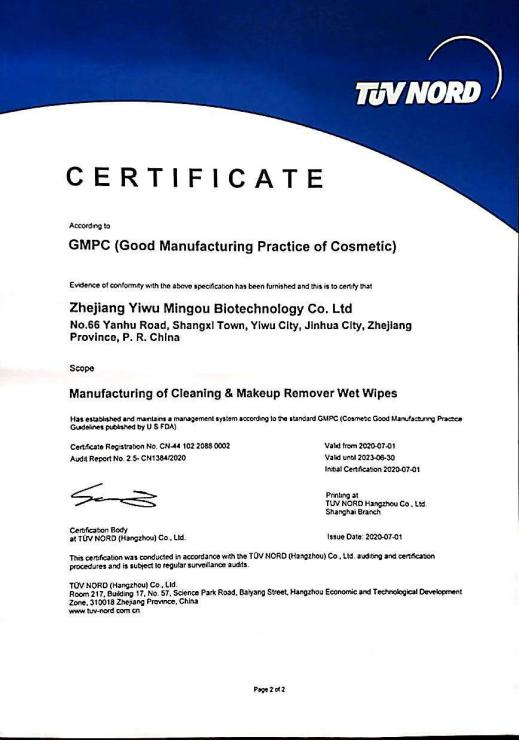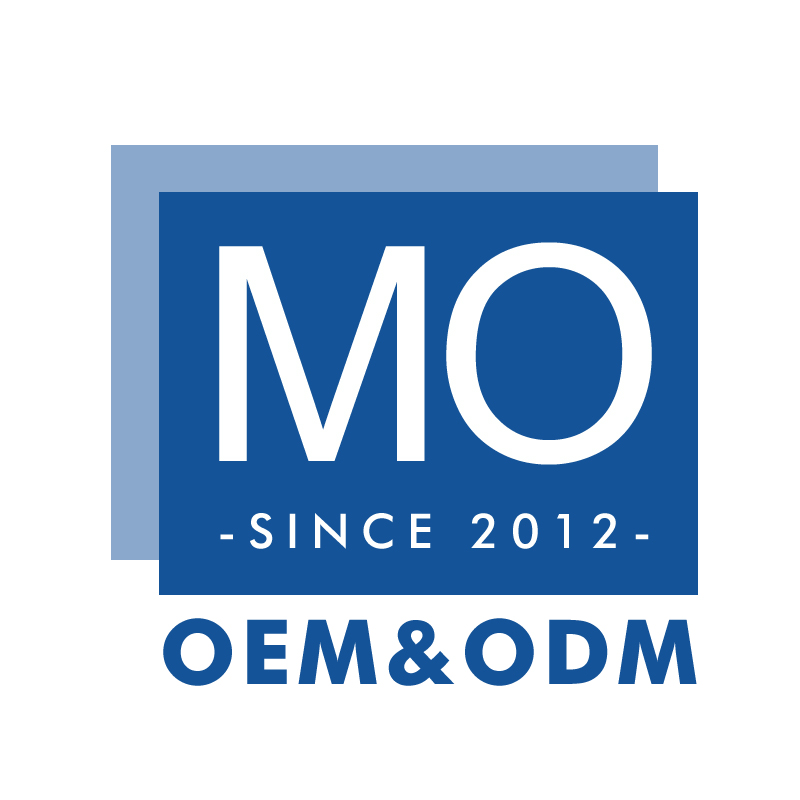Here at Mingou wet wipes factory, we want you to make an informed decision before purchasing with us. That is why we have supplied you with Wet Wipes buying guide to help you make that decision.
Why import wipes from China?
●First,there are already many companies proving that importing wet wipes from China is profitable. There are also many people who want to import from China, but lack the confidence to try because of language barriers, complicated international trade processes, scams or concerns about product quality. Here we will help you understand and master each step.
There are many suppliers in China, and a good supplier is an important factor for your successful business. It starts with knowing and knowing the background of the supplier. For example, the history of the factory, generally more than 3 years, can be relatively safe and stable.
(Our factory has a history of 10 years, we also have our own office building, and the business has been very stable.


So far, we have cooperated with customers in more than 30 countries. For example: Colombia Uruguay Brazil Peru Venezuela Ecuador United States United Kingdom Germany Canada Italy South Africa Nigeria Africa and so on.)
●Secondly,the certification of the factory and the certification of the product need to be seen. (Our company’s certificates and product certificates are relatively complete, such as: Hygiene License, Disinfection Product Business License, GMP FDA ISO, etc.)


●Furthermore, you can get a quick quote based on different trade terms.
When you are negotiating with the factory, you should encounter Incoterms. There are many different terms that will affect the quotation accordingly. Here are 3 commonly used in actual business:
1.EXW Quote
Under this term, suppliers quote you the original product price. They aren’t responsible for any shipping costs. That is the buyer arranges to pick up goods from the supplier’s warehouse. Hence, it is not advisable if you don’t have your own forwarder or you are a newbie.
2.FOB Quote
Aside from product price, FOB also includes the shipping costs for delivering the goods to the vessel in your appointed seaport or airport. After that, the supplier is free of all risks of the goods, that is,
(FOB quote=original product cost + shipping cost from supplier’s warehouse to agreed port in China + exporting process fee.)
3.CIF Quote
The supplier is responsible for delivering goods to the port in your country, then you need arrange to ship your goods from the port to your address.
As for the insurance, it doesn’t help if your products got damaged during shipping. It only helps when the whole shipment gets lost. That is,
(CIF quote = original product cost + shipping cost from supplier’s warehouse to the port in your country + insurance + exporting process fee.)
Choose the best supplier via price, sample, communication, service
After evaluating suppliers’ backgrounds, there are 5 other essential factors that will determine which supplier you end up working with.
1.The Lowest prices might come with pitfalls
Although the price is a key aspect you should consider when you select suppliers, you may be risky of buying bad quality products. Perhaps the production quality is not as good as others such as thinner material, smaller actual product size.
2.Get samples to evaluate mass production quality
All suppliers promise to say the product quality would be good, you can’t just take their words. You should ask for a sample in hand to assess if they can produce products according to your requirements, or if their existing goods are exactly what you want.
3.Good communication
If you have repeated your requirements over and over, but your supplier still didn’t make products as you requested. You have to spend huge efforts to argue with them to reproduce the product or refund the money. Especially when you meet Chinese suppliers who are not fluent in English. That will drive you even more crazy.
Good communication should have two features:
- Always understand what you need.
- Professional enough in his industry.
4.Compare the lead time
Lead time means how long it takes to produce and get all products ready to ship after you place the order. If you have several supplier’s options and their prices are similar, then it’s better to choose the one that has a shorter lead time.
5.Consider shipping solution & shipping cost
If you don’t have a trusted freight forwarder, and you prefer suppliers to help you handle logistics, then you have to compare not only product prices, but also logistics costs and solution.
Confirm payment terms before place the order
Before reaching an agreement with your supplier, there are many important details you should pay attention to.
- Proforma Invoice
- Non-Disclosure Agreement
- Lead time and delivery time
- Solutions for defective products.
- Payment terms and methods
One of the most important is the payment. The right payment term can help you keep a continuous cash flow. Let’s take a look at the international payments and terms.
Common payment methods
- Wire Transfer
- Western Union
- PayPal
- Letter of Credit(L/C)
Common payment terms
- 30% Deposit, 70% Balance Before Exporting.
- 30% Deposit, 70% Balance Against Bill of Landing.
- No Deposit, Whole Balance Against Bill of Landing.
- O/A payment.
Chinese suppliers usually adopt such a payment clause: 30% deposit before manufacturing, 70% balance before shipping out from China. But it varies from different suppliers and industries.
For example, for product categories usually with low profit but large-value orders like steel, to obtain more orders, suppliers may accept a 30% deposit, 70% balance before arrival at the port.
Choose the best shipping solution according to time & cost preference
After completing the production, how to ship the products from China to you is the next important step, there are 6 common types of shipping methods:
- Courier
- Sea freight
- Air freight
- Railway freight for full container load
- Sea/airfreight plus courier for eCommerce
- Economic shipping for dropshipping (less than 2kg)
Handle custom clearance, deliver products to doorstep
The last important step is customs clearance. You should know what documents or certificates are needed in the process.
In the process of the export customs clearance in China,the following documents are necessary for all kinds of products:
- Contract
- Commercial invoice
- Packing list
- Bill of lading
- Certificate of origin
Of course, there are additional certificates needed according to different customs supervision requirements on products. But for the export process, you needn’t worry about it too much. Usually, the supplier will help you tackle it.
In the process of import customs clearance in your country, there are also some standards or documents according to customs requirements in your country. But 5 documents are needed just the same as the export process, including commercial invoice, contract, packing list, bill of lading,cerrificate of origin. But some other certificates are different according to countries or products. You can consult the freight forwarder who can help you with logistics.
Apart from the certificates, you need to pay for customs duties. But the standard is different according to countries or products. For example, if you import shoes from China to America, you need to pay customs duties, MPF(merchandise processing fee), and HMF(harbor maintenance fee).
You can consult freight forwarders or your customs broker for documents required and product duty rate.

